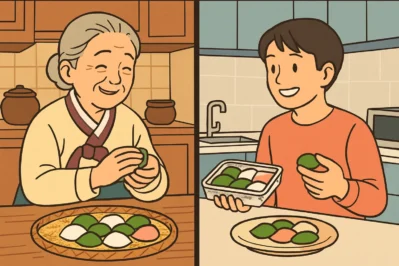Korean Holiday Food 2.0: From Tteokguk to Meal Kits!
Hello! Welcome to [Maeil Hangeul], here to upgrade your Korean skills!
Have you ever been invited to a Korean friend’s house for a holiday like Chuseok (추석) or Seollal (설날)? The table is always full of amazing food! Today, we’ll learn how to describe these delicious holiday dishes like a native speaker. This will be super useful for impressing your Korean friends and showing appreciation for their cooking.
Especially these days in Korea, the way people prepare holiday food is changing. While traditional homemade food is still cherished, high-quality “meal kits” (밀키트) for holiday dishes are becoming incredibly popular. Let’s learn the vocabulary to talk about both the traditional flavors and this modern trend!
Core Expressions You Need to Know
Here are some essential words to describe the taste and feeling of Korean holiday food.
- 한국어 표현: 쫄깃쫄깃하다
- 발음 [로마자]: jjolgit-jjolgit-hada
- 영어 뜻: To be chewy (in a pleasant way)
- 상세 설명: This is the perfect word for describing the texture of rice cakes (tteok, 떡), which are in everything from tteokguk (떡국, rice cake soup for New Year’s) to songpyeon (송편, half-moon rice cakes for Chuseok). It refers to a soft, springy, and satisfying chewiness. You can use it for noodles and jellies too!
- 한국어 표현: 고소하다
- 발음 [로마자]: gosohada
- 영어 뜻: To be savory, nutty, aromatic
- 상세 설명: This is a unique Korean flavor word that doesn’t have a perfect English equivalent! It describes the rich, warm, and nutty taste and smell of things like toasted sesame oil, roasted nuts, or soybean powder. You’ll taste it in the sesame oil used for japchae (잡채, glass noodle stir fry) and the filling of songpyeon.
- 한국어 표현: 손맛
- 발음 [로마자]: son-mat
- 영어 뜻: “Hand taste”; someone’s unique, delicious touch in cooking
- 상세 설명: This is a beautiful cultural concept. It literally means “hand taste” and refers to the special, hard-to-replicate flavor that comes from a person’s experience and care in cooking. When you say food has good sonmat, it’s a huge compliment, suggesting it’s much better than store-bought food. It’s the “secret ingredient” of love!
- 한국어 표현: 정성이 가득하다
- 발음 [로마자]: jeongseong-i gadeuk-hada
- 영어 뜻: To be full of sincerity/careful effort
- 상세 설명: Jeongseong (정성) means sincerity, heart, and devoted effort. When you say a dish is jeongseong-i gadeuk-hada, you’re not just complimenting the taste, but also acknowledging the time and care the cook put into preparing it. It’s a very warm and respectful compliment, perfect for holiday food which often takes a long time to make.
Example Conversation
Let’s see how these expressions are used in a real conversation.
A: 민준 씨, 추석 잘 보냈어요? (Minjun, did you have a good Chuseok?)
B: 네! 이번에는 송편 만들기 밀키트를 사 봤어요. (Yes! This time, I bought a songpyeon-making meal kit.)
A: 와, 정말요? 어땠어요? 떡이 쫄깃쫄깃했어요? (Wow, really? How was it? Was the rice cake chewy?)
B: 네! 그리고 깨 소가 정말 고소했어요. 물론 우리 할머니의 손맛은 아니지만요. (Yes! And the sesame filling was so savory. Of course, it’s not my grandma’s sonmat.)
A: 그래도 직접 만들었으니까 정성이 가득하네요! 맛있었겠어요. (Still, since you made it yourself, it’s full of care! It must have been delicious.)
Culture Tip & Trend Deep Dive
The Evolution of Jeongseong (정성) in the Age of Meal Kits
Traditionally, showing jeongseong during holidays meant spending days preparing dozens of dishes from scratch. The effort itself was a sign of love and respect for family and ancestors.
However, modern lifestyles in Korea are busy. This has led to the huge popularity of holiday meal kits. Famous restaurants and chefs now sell pre-portioned ingredients for complex dishes like galbijjim (갈비찜, braised short ribs) and japchae.
Does this mean Koreans care less? Not at all! The concept of jeongseong is evolving. Today, many people feel that taking the time to assemble a high-quality meal kit and share it with loved ones is a new, modern way of showing care. So, when you see a friend using a meal kit, you can still say “정성이 가득하네요!” to acknowledge their effort in today’s busy world. You’ll sound just like a trendy, understanding Korean!
Let’s Wrap It Up & Practice!
Today we learned four fantastic expressions to describe Korean holiday food: 쫄깃쫄깃하다 (chewy), 고소하다 (savory/nutty), 손맛 (“hand taste”), and 정성이 가득하다 (full of care).
Now it’s your turn!
Quick Quiz: Fill in the blank with the most natural expression.
My friend spent all day making japchae for me. The noodles were perfect and the sesame oil smelled amazing. This dish is truly ______!
(A) 쫄깃쫄깃해요
(B) 정성이 가득해요
Leave your answer in the comments below, and try making a sentence with one of the words we learned today! Happy learning






